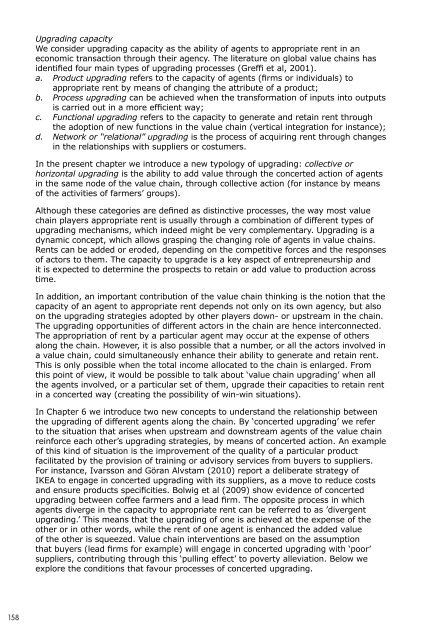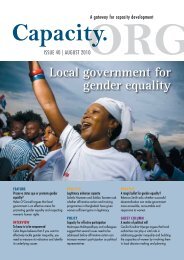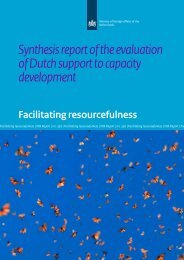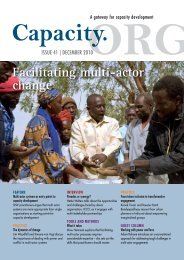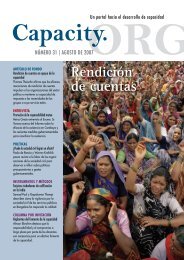Pro-Poor Value Chain Development - Capacity.org
Pro-Poor Value Chain Development - Capacity.org
Pro-Poor Value Chain Development - Capacity.org
Create successful ePaper yourself
Turn your PDF publications into a flip-book with our unique Google optimized e-Paper software.
158<br />
Upgrading capacity<br />
We consider upgrading capacity as the ability of agents to appropriate rent in an<br />
economic transaction through their agency. The literature on global value chains has<br />
identified four main types of upgrading processes (Greffi et al, 2001).<br />
a. <strong>Pro</strong>duct upgrading refers to the capacity of agents (firms or individuals) to<br />
appropriate rent by means of changing the attribute of a product;<br />
b. <strong>Pro</strong>cess upgrading can be achieved when the transformation of inputs into outputs<br />
is carried out in a more efficient way;<br />
c. Functional upgrading refers to the capacity to generate and retain rent through<br />
the adoption of new functions in the value chain (vertical integration for instance);<br />
d. Network or “relational” upgrading is the process of acquiring rent through changes<br />
in the relationships with suppliers or costumers.<br />
In the present chapter we introduce a new typology of upgrading: collective or<br />
horizontal upgrading is the ability to add value through the concerted action of agents<br />
in the same node of the value chain, through collective action (for instance by means<br />
of the activities of farmers’ groups).<br />
Although these categories are defined as distinctive processes, the way most value<br />
chain players appropriate rent is usually through a combination of different types of<br />
upgrading mechanisms, which indeed might be very complementary. Upgrading is a<br />
dynamic concept, which allows grasping the changing role of agents in value chains.<br />
Rents can be added or eroded, depending on the competitive forces and the responses<br />
of actors to them. The capacity to upgrade is a key aspect of entrepreneurship and<br />
it is expected to determine the prospects to retain or add value to production across<br />
time.<br />
In addition, an important contribution of the value chain thinking is the notion that the<br />
capacity of an agent to appropriate rent depends not only on its own agency, but also<br />
on the upgrading strategies adopted by other players down- or upstream in the chain.<br />
The upgrading opportunities of different actors in the chain are hence interconnected.<br />
The appropriation of rent by a particular agent may occur at the expense of others<br />
along the chain. However, it is also possible that a number, or all the actors involved in<br />
a value chain, could simultaneously enhance their ability to generate and retain rent.<br />
This is only possible when the total income allocated to the chain is enlarged. From<br />
this point of view, it would be possible to talk about ‘value chain upgrading’ when all<br />
the agents involved, or a particular set of them, upgrade their capacities to retain rent<br />
in a concerted way (creating the possibility of win-win situations).<br />
In Chapter 6 we introduce two new concepts to understand the relationship between<br />
the upgrading of different agents along the chain. By ‘concerted upgrading’ we refer<br />
to the situation that arises when upstream and downstream agents of the value chain<br />
reinforce each other’s upgrading strategies, by means of concerted action. An example<br />
of this kind of situation is the improvement of the quality of a particular product<br />
facilitated by the provision of training or advisory services from buyers to suppliers.<br />
For instance, Ivarsson and Göran Alvstam (2010) report a deliberate strategy of<br />
IKEA to engage in concerted upgrading with its suppliers, as a move to reduce costs<br />
and ensure products specificities. Bolwig et al (2009) show evidence of concerted<br />
upgrading between coffee farmers and a lead firm. The opposite process in which<br />
agents diverge in the capacity to appropriate rent can be referred to as ’divergent<br />
upgrading.’ This means that the upgrading of one is achieved at the expense of the<br />
other or in other words, while the rent of one agent is enhanced the added value<br />
of the other is squeezed. <strong>Value</strong> chain interventions are based on the assumption<br />
that buyers (lead firms for example) will engage in concerted upgrading with ‘poor’<br />
suppliers, contributing through this ‘pulling effect’ to poverty alleviation. Below we<br />
explore the conditions that favour processes of concerted upgrading.


